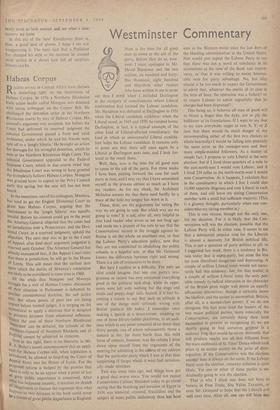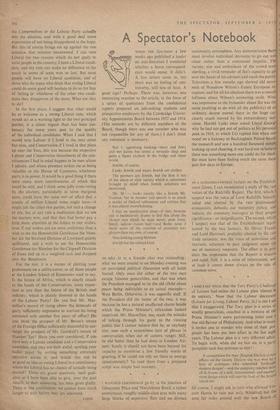Westminster Commentary
Now is the time for all good men to come to the aid of the party. Before they do so, how- ever, I must apologise to Mr. David Hardman and the two million, six hundred and forty- five thousand, eight hundred and fifty-three other readers who have written to me to point out that I erred when I included Darlingto'n in the category of constituencies where Liberal intervention had harmed the Labour candidate. Mr. Hardman was defeated at Darlington in 1951 when the Liberal candidate withdrew; when the Liberal stood, in 1945 and 1950, he romped home. Darlington, in fact, is a typical example of the other kind of Liberal-affected constituency; the kind in which an unsuccessful Liberal candida- ture helps the Labour candidate. It remains only to point out that there will once again be a Liberal at Darlington next time, and I look for- ward to the result there.
Well, then, now is the time for all good men to come to the aid of the party. For three weeks I have been putting forward the case for each party in turn, and I may say that I have astonished myself in the process almost as much as I have my readers. As for my cheek, Sir Archibald Mclndoe assures me that there need hardly be a trace of the hole my tongue has worn in it.
Those, then, are the arguments for voting the way we are going to vote. But which way are we going to vote? It is not, after all, very helpful to that kind reader who wrote to me not long ago and made me a present of.his vote to say that the Conservatives' record in the struggle against in- flation is on the whole an excellent one, or that the Labour Party's education policy, now that they are not committed to abolishing the public schools, is a hopeful one, or that Mr. Grimond knows the difference between right and wrong. There is a job of evaluation to be done.
But here I confess to a difficulty. For only an idiot could imagine that any one party's pro- gramme or record has ever contained everything good in the political tuck-shop, while its oppo- nents were left with nothing but the slugs and snails and puppy-dogs' tails. Indeed, it is fast be- coming a truism to say that such an attitude is one of the things most seriously wrong with British political life today. I remember once making a speech at a street-corner, standing on one of those library-ladder platforms, to an audi- ence which at one point consisted of no fewer than thirty people, one of whom subsequently threw a tomato at me; far more harsh than this mild form of censure, however, was the rebuke I drew down upon myself from the organisers of the meeting for admitting in the course of my address that the particular party which I was at that time supporting (I forget which it was) had occasion- ally made mistakes.
This was some time ago, and things have got a good deal worse since. You would not expect Conservative Cabinet Ministers today to go about saying that the bombing and invasion of Egypt in 1956 was immoral, criminal, fraudulent and the subject of more public dishonesty than has been seen in the Western world since the last days of the Harding administration in the United States. Nor would you expect the Labour Party to say that there was not a word of substance in its accusations at the time of the Bank rate contro- versy, or that it was willing to smear honour- able men for party advantage. No, but why should it be too much to expect the Government to admit that, whatever the merits of its case at the time of Suez, the operation was a failure? or to expect Labour to admit regretfully that its charges had been disproved?
This being so, it behoves all men of good will to thrust a finger into the dyke, not to ply the bulldozer at its foundations. If I were to say that in my view everybody ought to vote X, Y, or Z (not that there would be much danger of my recommending either of the first two choices so whole-heartedly) I would be falling into precisely the same error as the manager-men and their more simple-minded followers. As a matter of simple fact, I propose to vote Liberal at the next election; but if I lived three-quarters of a mile to the east-north-east I would vote Labour, and if I lived 239 miles to the north-north-west I would vote Conservative. As it happens, I calculate that in the constituency in which I live I could don 14,000 separate disguises and vote Liberal in each of them, and still leave my sitting Conservative member with a small but sufficient majority. (This is a gloomy thought, particularly when one con- siders who my sitting member.is.) This is one reason, though not the only one, for nsy decision. For it is likely that the Con- servatives will win the election; possible that the Labour Party will. In either case, it seems to me that a substantial popular vote for the Liberals is almost a necessity for British political life. This is not a question of party politics at all; as I suggested last week, there is a tendency in Bri- tain today that is supra-party, but none the less (or even therefore) dangerous and depressing. A couple of million Liberal votes would not neces- sarily halt this tendency; nor, for that matter, is a couple of million Liberal votes the only pos- sible remedy (a radical alteration in the character of the British press might well prove an equally efficacious alternative), though. it certainly seems the likeliest, and the easiest to accomplish. Britain, after all, is a second-class power; if we do not recognise this fact soon (and the leaders of the two major political parties, more especially the Conservatives, are certainly doing their level damnedest to prevent us recognising it), we are shortly going to find ourselves gripped in a national frog-that-would-be-an-ox dementia that will produce results not all that different from the mass outbreaks of St. Vitus' Dance which took place in an earlier society on the point of disin- tegration. If the Conservatives win the election, another Suez is always on the cards. If the Labour Party wins the election, runaway inflation is quite likely. Yet one or other of these parties is un- doubtedly going to win the election.
That is why I think one does not have to believe in Free Trade, Site Value Taxation, or even Mr. Grimond to hope that the Liberals poll Well next time. After all, one can still hope that
the Conservatives or the Labour Party actually win the election, and with a good deal more expectation of not being disappointed in the hope.
But this of course brings me up against the one question that remains unanswered. I can vote Liberal for two reasons which do not apply to most people in the country; I have a Liberal candi- date, and my vote can make no difference to the result in terms of seats won or lost. But most people will have no Liberal candidate, and of those who do many who think that voting Liberal could do some good will hesitate to do so for fear of 'letting in' whichever of the other two candi- dates they disapprove of the more. What are they to do?
In the first place, 1 suggest that what would be as welcome as a strong Liberal vote; which
would act as a warning light to the two principal parties, is a. closer regard than has been cus- tomary for some years past to the quality of the individual candidates. When I said that I would vote Labour if I lived in the next street but nine, and Conservative if I lived in that place up near the Tees, this was because the respective Labour and Conservative incumbents of the con- stituencies I had in mind happen to be men whom I admire, and whose presence strikes me as being valuable to the House of Commons whichever party is in power. It would be a good thing if there were many more constituencies of which this could be said, and I think some jolly cross-voting by the electors, particularly in some marginal seats, could have the same sort of effect that a couple of . million Liberal votes might have—it might jolt the other two parties, not into a change of life, but at any rate a realisation that we are the masters now, and that they had better pay a little more attention iri the future to our wishes, even if our wishes are no more ambitious than a
wish to sec the Honourable Gentleman the Mem- ber for the Scotland Division of Liverpool quietly
spitlicated, and a wish to see the Honourable Gentleman the Member for the Chigwell Division of Essex tied up in a weighted sack and dropped into the Bosphorus.
For the rest, it is a matter of plotting your preferences on a utility-curve, as all those people at the London School of Economics used to say.
Is the future of Africa, which is clearly unsafe in the hands of the Conservatives, more impor- tant to you than the future of the British steel industry, which is plainly doomed in the hands of the Labour Party? Do you find Mr. Mac- millan's record of rising above the demands of party sufficiently impressive to warrant his being entrusted with another five years of office? Do you think the prospect of Mr. Bevan's tenure of the Foreign Office sufficiently distasteful to out- weigh the prospect of Mr. Gaitskell's tenure of Number Ten? Have you ever considered, if you have only a Labour candidate and a Conservative candidate, and they are both awful, spoiling your ballot paper by writing something extremely offensive across it; and would this not be as good an idea as voting Liberal in a constituency where the Liberal has no chance of actually being elected'? These arc grave questions; such guid- ance as 1 have been able to give, over the past month, to their answering, has been given gladly. There is one coaolation; we cannot have much longer to wait before they are answered.
TAPER



































 Previous page
Previous page